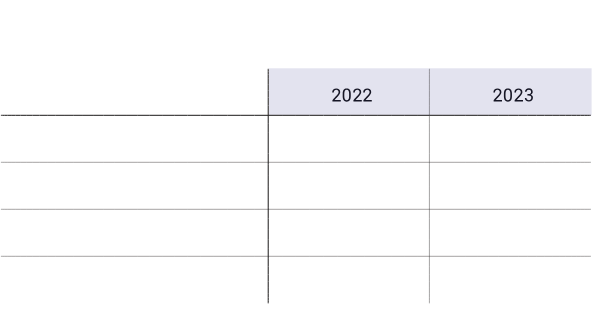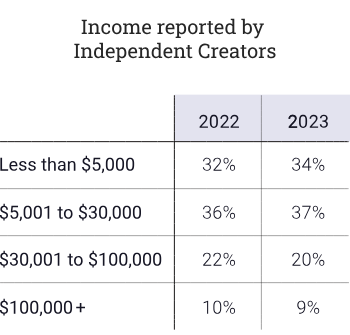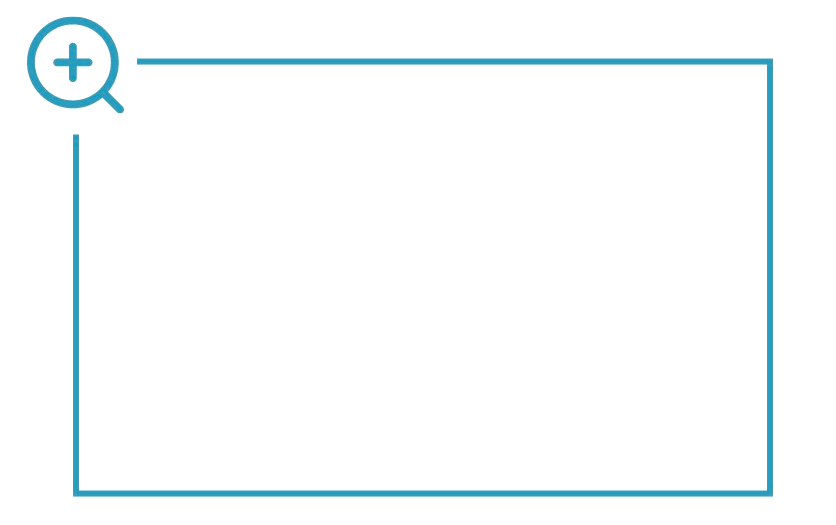The creator economy refers to businesses that create and monetize online digital content, mainly through a mix of advertising revenue, sponsorships, subscriptions, and product sales.
The creator economy refers to businesses that create and monetize online digital content, mainly through a mix of advertising revenue, sponsorships, subscriptions, and product sales.
This study focuses on a subset of the broader creator economy, independent creators―independent workers (self-employed, solopreneurs, freelancers, gig workers, etc.)―who earn money creating and distributing digital content.
This study focuses on a subset of the broader creator economy, independent creators-independent workers (self-employed, solopreneurs, freelancers, gig workers, etc.)-who earn money creating and distributing digital content.
Meet the Creators
Independent creators come from all ages and walks of life but tend to be younger and skew male. About 6 in 10 (63%) are 40 or younger, and 53% are male.
But older cohorts ― Baby Boomers and Gen X ― increased their share of independent content creators from 27% in 2022 to 35% in 2023. The main driver of this growth is the growing popularity of online topics of interest to older consumers.
Seven in ten independent creators (70%) report working part-time in the creator economy, with 30% reporting they work full-time as independent digital content creators.
Percentage of Independent Creators by Generation
Percentage of Independent Creators by Generation
0%
0%
0%
0%
Independent Creators Plateaued in 2023
The creator economy grew rapidly from 2015 to 2022, especially during the peak pandemic years of 2021 and 2022.
Income reported by Independent Creators

- Less than $5,000
- $5,001 to $30,000
- $30,001 to $100,000
- $100,000 +
- 32%
- 36%
- 22%
- 10%
- 34%
- 37%
- 20%
- 9%

Lockdowns and the shift to remote work significantly increased online engagement, including an uptick in demand for YouTube, TikTok, and other forms of online content made by independent creators.
Also driving the growth of the creator economy are the fame and fortune achieved by a small subset of independent creators. Creators like Mr. Beast, the D'Amelio sisters, and others have vast online followings and earn millions of dollars. Their highly trumpeted success has significantly raised the profile of content creators and encouraged others to join the creator economy.
However, most independent creators earn modest amounts of money. Our survey data shows that only 9% of independent creators reported making over $100,000 last year. Another 34% earned less than $5,000, and 37% made between $5,000 and $30,000. Put another way, 71% of independent creators reported making less than $30,000 from their creator economy work over the prior year.
These economic realities, widely reported in the media over the past 18 months, help explain our 2023 census findings. The number of independent creators earning money by creating and distributing digital content declined slightly, from 8.2 million in 2022 to 8.1 million in 2023.
This slowdown was also driven by press and social media coverage on the key challenges of working as an independent creator.
It is hard to be successful and avoid creator burnout. Our survey found that almost half of independent creators (46%) reported it's hard to be successful in the creator economy, with four in ten (41%) saying they struggle with burnout. This combination of challenges has given the high-earning superstar creator lifestyle myth a reality check.
These economic realities, widely reported in the media over the past 18 months, help explain our 2023 census findings. The number of independent creators earning money by creating and distributing digital content declined slightly, from 8.2 million in 2022 to 8.1 million in 2023.
This slowdown was also driven by press and social media coverage on the key challenges of working as an independent creator.
It is hard to be successful and avoid creator burnout. Our survey found that almost half of independent creators (46%) reported it's hard to be successful in the creator economy, with four in ten (41%) saying they struggle with burnout. This combination of challenges has given the high-earning superstar creator lifestyle myth a reality check.
Number of US Independent Creators Earning Money
(in millions)
Our survey found that almost half of independent creators (46%) reported it's hard to be successful in the creator economy, with four in ten (41%) saying they struggle with burnout.
The Trends Driving Future Creator Economy Growth
Despite the slight decline in the number of independent creators in 2023 and greater awareness of the challenges of being an independent creator, the outlook for future growth is quite positive.
According to the global financial firm Goldman Sachs, the creator economy is expected to roughly double to $480 billion by 2027, up from about $250 billion in 2023. The main driver of this growth is anticipated increases in influencer marketing spend by advertisers, which will lead to more revenue opportunities for independent creators.
Technology is also making creative endeavors cheaper and easier. Internet platforms like YouTube, TikTok, Instagram, and others provide independent creators access to vast audiences. Relatively inexpensive yet powerful content creation software and hardware have democratized content creation, allowing even solopreneur independent creators to produce content that matches the quality of Hollywood.
There's also a burgeoning number of firms providing resources and services for independent creators. This growing support ecosystem helps independent creators run their businesses, generate revenue, produce professional content, and find and engage audiences. This growing ecosystem and improving creator technology make it easier for creators to become independent.
The strong interest of younger workers in becoming independent creators is another driver of creator economy growth.
According to the research firm Morning Consult, online influencer (a major independent creator category) is the top career choice of Gen Z (aged 12-27), with 57% reporting they would like to be an influencer. As the large Gen Z cohort ages into the workforce, many more will become independent content creators.
The Trends Driving Future Creator Economy Growth
Despite the slight decline in the number of independent creators in 2023 and greater awareness of the challenges of being an independent creator, the outlook for future growth is quite positive.
According to the global financial firm Goldman Sachs, the creator economy is expected to roughly double to $480 billion by 2027, up from about $250 billion in 2023. The main driver of this growth is anticipated increases in influencer marketing spend by advertisers, which will lead to more revenue opportunities for independent creators.
Technology is also making creative endeavors cheaper and easier. Internet platforms like YouTube, TikTok, Instagram, and others provide independent creators access to vast audiences. Relatively inexpensive yet powerful content creation software and hardware have democratized content creation, allowing even solopreneur independent creators to produce content that matches the quality of Hollywood.
There's also a burgeoning number of firms providing resources and services for independent creators. This growing support ecosystem helps independent creators run their businesses, generate revenue, produce professional content, and find and engage audiences. This growing ecosystem and improving creator technology make it easier for creators to become independent.
The strong interest of younger workers in becoming independent creators is another driver of creator economy growth.
According to the research firm Morning Consult, online influencer (a major independent creator category) is the top career choice of Gen Z (aged 12-27), with 57% reporting they would like to be an influencer. As the large Gen Z cohort ages into the workforce, many more will become independent content creators.



